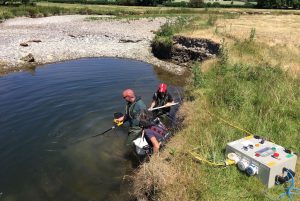Informing the water industry & Environment Agency
“About Drought has informed the water industry, now we need some sort of mechanism to identify the most useful outputs from strategic to operational products. We must not let those fall through a crack now that About Drought has finished.”
Paul Crockett, Principal Officer, Environment Agency

“About Drought has helped generate a step change in thinking around what is possible and what can be done, and over the next 10 years or so we will be making better decisions, using better tools because of it,” says Paul Crockett who is leading the modelling work on the National Water Resources Planning Framework for the Environment Agency.
Yet Paul, who has worked closely with the MaRIUS project and About Drought (ENDOWS), believes there is still more to be done in encouraging the water industry to catch up with the latest outcomes of the programme’s data and tools.
Real-time decision-making support for the water industry
About Drought has supported the water industry in both strategic planning and real-time decision-making during a time when it has come under pressure to collaborate across water company boundaries on regional forward planning, as well as approaches to dealing with issues as they arise with a greater level of accountability.
MaRIUS and ENDOWS have held a series of workshop events specifically for the industry, working alongside key stakeholders to match its research to their needs.
With the National Water Resources Planning Framework driving water companies to work together to build resilience into water management with clear, joined-up direction from Government departments, agencies and water regulators, the industry is now more ready to be receptive, Paul feels.
He says: “There are a lot of great products from MaRIUS and About Drought but the water industry – the customer, if you like – is only just seeing the potential.”
Improving the industry’s understanding of statistics
Historic Droughts’ work in reconstructing reliable rainfall, river flow and groundwater data back to 1890, as well as providing standardised drought indices has been important in putting events into context, improving the industry’s understanding of statistics, the latest methodologies and stakeholder needs. There is still more to be done in migrating data from the academic models to those the water companies use.
The water resource model developed by MaRIUS is being adopted for use by Paul’s team, to help the National Water Resources Planning Framework assess the potential effects of different types of drought and climate change impacts at a national scale, and test management strategies.
Giving the water industry better knowledge and insights
Paul’s concern is that with the impacts of climate change starting to be felt on the reliability of water availability, it is the wrong time to bring About Drought to an end. He says: “It’s so important to have About Drought following on from the original research projects; it demonstrated what is possible, the better knowledge and insight we can get from the information that decisions will be based on in the future. The team really helped to educate the industry rather than just educating other academics.
“We need to look at the tools we can use to take it even further forward now that the industry is starting to buy into it more.
“About Drought has informed the water industry, now we need some sort of mechanism to identify the most useful outputs from strategic to operational products. We must not let those fall through a crack now that About Drought has finished.
“About Drought is to be applauded for what it has done but it needs more time and resources if it is to maximise the outcome for UK plc of all this research.”
Interview by Sally Stevens
Posted October 2019
